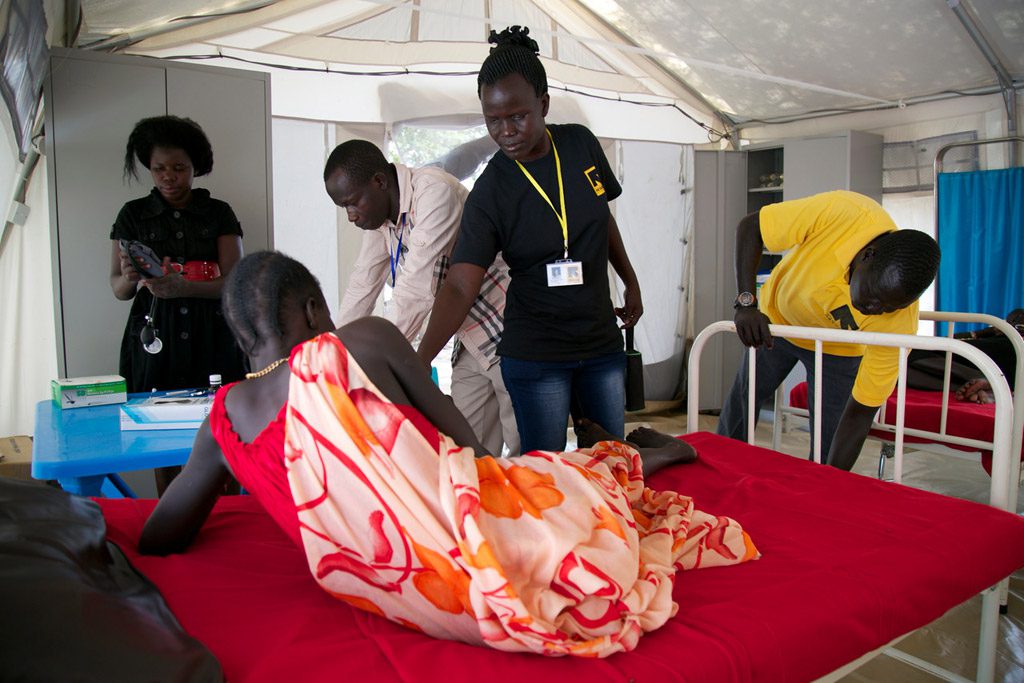
The World Health Organization (WHO) today appealed to donors to provide $1 billion for life-saving health needs ranging from childhood vaccinations to surgical care for the severely wounded for some 25 million people caught up in conflict across the Central African Republic, Iraq, South Sudan and Syria.
The United Nations health agency made that call today, on behalf the entire Health Cluster of humanitarian organizations it coordinates, at a special session at its Geneva headquarters attended by more than 50 donor countries and other Member States.
“This unprecedented number of humanitarian emergencies, combined with the Ebola outbreak response in West Africa, have demonstrated WHO’s ability to respond to major health emergencies,” Dr. Bruce Aylward, Special Representative of the Director-General for Ebola Response and Assistant Director-General for Emergencies said in a news release.
“But the huge stresses they pose also underscore the great needs – and funding gaps – that WHO, and our health partners, from NGOs to sister United Nations agencies, face,” Dr Aylward added.
All four countries for which the appeal was made are classified as so-called “Grade 3” category crises, which require the highest-level of response that the UN can deliver.
In each of the countries – the Central African Republic (CAR), Iraq, South Sudan and Syria – WHO reported that the needs range from basic health care such as childhood vaccinations to surgical care for severely wounded patients caught up in the conflicts.
“In Iraq and CAR, for example, around one-quarter of hospitals, clinics and other health facilities have been damaged in their respective conflicts, or are not functioning,” according to WHO. “The sheer scale of humanitarian needs in 2014, coupled with insufficient funding levels, has stretched the capacity of the entire humanitarian system, including WHO, to the limit.”
Overall, the Health Cluster group of humanitarian organizations needs $1 billion – $322.7 million by WHO and $687 million for its partner agencies – to deliver health services to 25 million people in the major crises, the majority women and children, as follows:
- Central African Republic: 1.4 million people in need of humanitarian health support; with $48 million needed by the health sector;
- Iraq: 4 million people needing humanitarian health support; $218.7 million needed by the health sector;
- South Sudan: 3.3 million people needing humanitarian health support; $90 million required by the health sector;
- Syria: 16.4 million people needing humanitarian health support; $687 million required by the health sector in Syria and neighbouring countries.
WHO and its partners have provided care to millions of people across each country ranging from routine immunization programmes against measles, polio and other vaccine-preventable diseases, delivering medical and health services ranging from surgical care, treating non-communicable diseases like cancers, diabetes, heart and lung diseases, and providing primary health care support to remote and besieged communities.
FRENCH VERSION
L’Agence de santé des Nations Unies a fait cet appel aujourd’hui,au nom de l’ensemble du Cluster santé des organisationshumanitaires, qu’il coordonne, lors d’une session extraordinaire àson siège de Genève a participé à plus de 50 pays donateurs etd’autres États membres.
“Ce nombre sans précédent d’urgence humanitaire, combinée àla riposte d’Ebola en Afrique de l’Ouest, ont démontré des WHO de capacité à réagir aux urgences de santé majeur,” Dr BruceAylward, représentant spécial du directeur général pour laréponse de l’Ebola et sous-directeur général pour les situations d’urgence, a déclaré dans un communiqué.
« Mais les contraintes énormes, elles posent également soulignéles grands besoins – et les déficits de financement – que l’OMS etnotre santé partenaires, d’organisations non gouvernementales àsœur agences des Nations Unies, visage, », a ajouté le DrAylward.
Les quatre pays, dont l’appel a été effectuée sont qualifiées de « Grade 3 » catégorie crises dites, qui exigent le plus haut niveaude la réponse que l’ONU peut fournir.
Dans chacun des pays – la République centrafricaine (RCA), Irak,Sud-Soudan et la Syrie – qui ont déclaré que les besoins vont dessoins de santé tels que l’enfance vaccins aux soins chirurgicauxdes patients gravement blessés pris dans les conflits.
« En Irak et en voiture, par exemple, environ un quart deshôpitaux, cliniques et autres installations ont été endommagéesdans leurs conflits respectifs, ou ne sont pas de santé fonctionne » selon qui. « L’ampleur des besoins humanitaires en 2014,couplé avec des niveaux de financement insuffisants, a étendu lacapacité de l’ensemble du système humanitaire, dont l’OMS,jusqu’à la limite. »
Dans l’ensemble, le groupe de Cluster santé des organisationshumanitaires doit $ 1 milliard – $ 322,7 millions par l’OMS et $687 millions pour les organismes partenaires – fournir desservices de santé à 25 millions de personnes dans les crisesmajeures, la majorité femmes et des enfants, comme suit :


